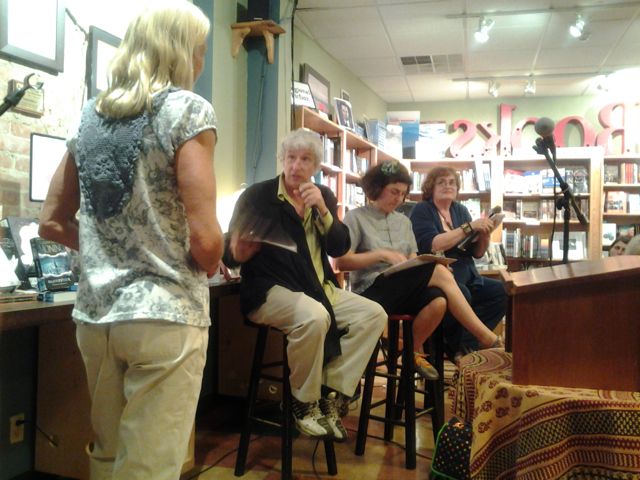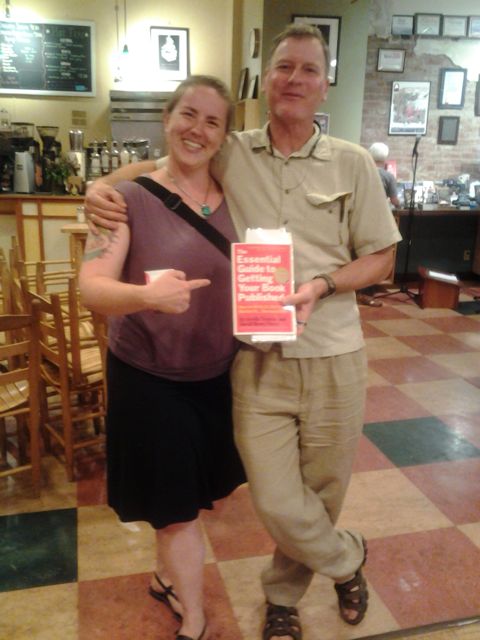If you’ve been following along, with Pitchalooza parts one and two, then you know about my preparation for Pitchapalooza, the how-to-pitch-your-book-to-a-literary-agent event that took place at Malaprop’s last on June 22. Here’s a recap of the event itself:
Arielle Eckstut and David Henry Sterry, along with Asheville-based writer Marcianne Miller, made up the judging panel for an audience of more than 100. Malaprop’s had closed its doors from 6-6:30 p.m. and the hopeful authors who lined up outside signed up if they were interested in pitching their book. (Everyone who had purchased a copy of The Essential Guide to Getting Your Book Published from Malaprop’s also received a card with an e-mail address to set up a 20-minute phone consultation with Eckstut and Sterry.)

When Eckstut, Sterry and Miller appeared, I was surprised that they were all very casually dressed — Essential stresses the importance of dressing to impress when meeting an agent or publisher. But Sterry (who explained from the beginning that he and Eckstut would keep their presentation short to leave time for as many one-minute pitches as possible) promised to critique gently. “We won’t ask you who dressed you this morning or if you got your hair cut in a Cuisinart,” he said.
When introducing the event, Malaprop’s employee Virginia McKinley said, “You can tell your descendants you were here in the back row when a famous author pitched their book.” And the pitches were quickly in progress.
There were 21 pitches in all, and the majority of authors went over the minute mark (Eckstut, the time keeper, cut off each pitch mid-word at 60 seconds). There were 21 pitches in all, and they ranged in subject matter from instructional books and self-help books to personal essays, crime novels, coming of age stories and coming out novels.
Some pieces of advice from the judges included:
• “In this day and age, to get the attention of a publisher, they’ll give you a mint and not much more.” (Sterry)
• “Every your best friend will get bored after a minute.” (Eckstut)
• “Young adult books are very popular right now. They’re flying off the shelves.” (Sterry)
• “Go to the section of the bookstore where your book is going to live and read 50 to 100 jackets. Then you’ll know how to pitch.” (Eckstut)
• “People in the book business are fanatical about category. For us to know what type of book yours is upfront is important.” (Sterry)
I was called 13th to pitch, and managed to get through my spiel in about 45 seconds with only one “um.” While mine wasn’t the winning pitch, I felt happy with it, and Sterry and Eckstut both responded positively. Some advice they gave me was, in my comparison (I used Eat, Pray, Love and The Thornbirds), not to use Eat, Pray, Love because (and I’m paraphrasing) it’s been played out. They also suggested that in my pitch I offer up more physical description, including what the main characters look like. (They told a crime writer, “We need the dead body up front,” and somehow I feel that’s related.)
While a couple of people told me, after the event, that they thought the judges were harsh with me, my experience was that they were positive and helpful. I also found that listening to 20 other pitches gave me a much clearer sense of what the pitch process involves and how a pitch, whether given verbally or in writing, could win over an agent or publisher. (That said, while I found PItchapalooza to be helpful and I’d suggest it to other unpublished writers, I was also aware that it was, first and foremost, a smart marketing ploy to sell copies of Essential. Then again, in a climate when books are somewhat of a hard sell, Sterry and Eckstut have found a smart formula for making money as writers — that’s a lesson any hopeful author should pay attention to.)

In the end, the prize (an introduction to a literary agent appropriate for the specific book that was pitched) went to two people (pictured above). Sterry and Eckstut specified that they never have two winners, but the Malaprop’s event was a special case because the pitch they decided was best belonged to an already-published author (Brian Lee Knopp, who wrote Mayhem in Mayberry), whereas the rest of the budding authors who pitched were unpublished (except for one man who had self-published a work of regional fiction). The other prize winner was Betsy Archer whose non-fiction work will be geared toward non-birth lesbian moms. I won’t give anymore away — you’ll have to read it for yourself.





Before you comment
The comments section is here to provide a platform for civil dialogue on the issues we face together as a local community. Xpress is committed to offering this platform for all voices, but when the tone of the discussion gets nasty or strays off topic, we believe many people choose not to participate. Xpress editors are determined to moderate comments to ensure a constructive interchange is maintained. All comments judged not to be in keeping with the spirit of civil discourse will be removed and repeat violators will be banned. See here for our terms of service. Thank you for being part of this effort to promote respectful discussion.